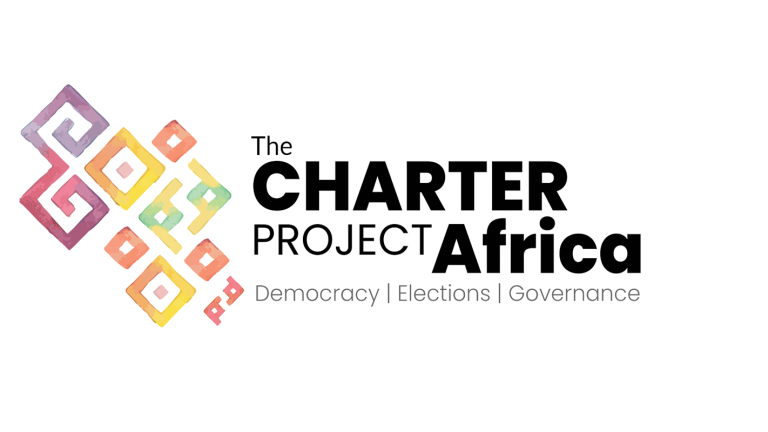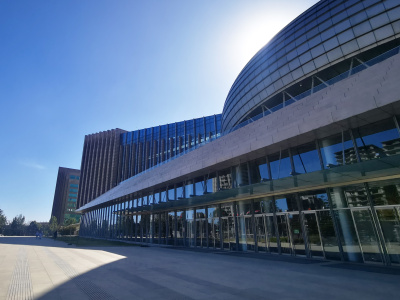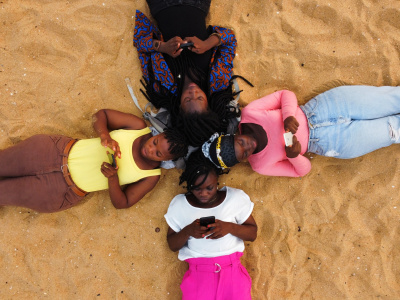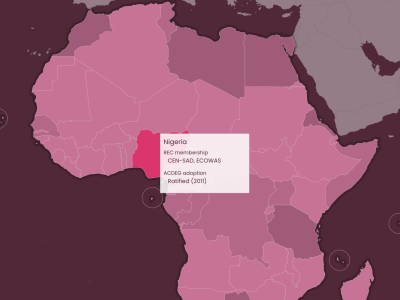
How the AU engages with its citizens: The formal, the informal and the anticipated
Authors
The AU engages with civil society through a mix of formal and informal mechanisms. Currently, a process is underway to propose a new formal engagement framework. Analysing the formal and informal mechanisms, Martin Ronceray and Andrew Songa argue that the accreditation reforms led by the AU Economic, Social and Cultural Council might fundamentally impact civil society-AU relations.
Summary
The AU is increasingly counting on the support of civil society organisations (CSOs) in areas as wide-ranging as early warning, advocacy on its shared-values instruments and election monitoring, to mention a few. Its approach to engaging with CSOs is pragmatic, employing a mix of formal and informal mechanisms. Currently, a process is underway to propose a new formal engagement framework. Depending on the direction it takes, this reform could have serious implications for pan-African civic space and the AU’s overall performance.
In this brief, we analyse the current formal and informal means of civil society engagement with AU institutions, zooming in on the Economic, Social and Cultural Council (ECOSOCC)’s accreditation mechanism – that is, the method of granting CSOs observer or consultative status. We examine why, despite the plethora of access mechanisms, accreditation remains important, and argue that the ECOSOCC-led accreditation reforms might fundamentally impact civil society-AU relations.
Introduction
The African Union (AU)’s Economic, Social and Cultural Council (ECOSOCC) will be celebrating its 20th anniversary in July 2024. At a 19 March 2024 press briefing to kick-start a series of commemorative events leading up to the anniversary, the head of the ECOSOCC Secretariat, Mr William Carew, underscored that the establishment of ECOSOCC as an organ of the AU was testament to the invaluable role that civil society organisations (CSOs) continue to play at all levels to compliment government efforts in driving sustainable peace and development in accordance with Agenda 2063.
Indeed, the AU has expressed its commitment to citizen engagement; from its very Constitutive Act, to the statements that celebrated its twentieth anniversary, and to its Agenda 2063 aspiration to “place the African people at the centre of all continental efforts, to ensure their participation in the transformation of the continent.” Putting people – and thus the civil society organisations through which they organise themselves – at the centre is instrumental in mobilising their good energies and their expertise, as well as in ensuring that policies are inclusive and rooted in local demand. This is the rationale that informed the establishment of ECOSOCC which is meant to facilitate partnerships and collaborations between civil society and AU member states and thereby increase the prospects for effective public participation at national and continental levels.
But how does the AU engage with civil society – and which civil society? Civil society organisations are considered legitimate partners and counterparts, especially because they structure their constituencies and represent them, and/or due to their expertise as being technically competent and willing to help. Thomas Tieku has classified CSOs that interact with the AU as follows: international ones, transnational African research centres, and African locally-rooted CSOs.
The AU prefers to work with CSOs that have expertise as well as sizable and recognisable constituencies. On paper, not many organisations tick all these boxes perfectly, in Africa as elsewhere. As a result, the different organs of the AU have taken to involving organisations in their decision-making processes on a case-by-case basis. These decisions are based on criteria that have as much to do with the trust built over time and through activities in which the organisation demonstrated its added value, as they do with the relevant AU instrument requirements and the legal nature of the organisation seeking engagement. This points to an engagement strategy based on utility: in addition to considering statutory provisions, structures of the AU organs pick and choose whether (and which) civil society adds value, according to their subjective judgement in light of the nature of the policy area in question and the needs of the moment. This creates informal pathways – in addition to formal ones – for engagement between the AU and civil society.
What works (and what does not) in AU-civil society engagement
Before we look further into the logic behind, and results of, informal AU-civil society engagement, let us first examine the formal avenues.
Currently, the AU has a stratified approach to formal engagement with civil society; one that sees various AU organs establish their own respective procedures to accrediting civil society and granting them an audience. Illustratively, the African Union Commission prior to the summits of the Assembly of Heads of State and Government, considers and grants accreditation to various organisations and non-African states seeking to be observers at the Summit. Other organs such as the African Commission on Human and Peoples’ Rights (ACHPR) and the African Committee of Experts on the RIghts and Welfare of the Child (ACERWC) also have their own criteria and guidelines for granting observer status to non-governmental organisations and associations. The African Governance Architecture’s citizen engagement strategy is also in the process of being revamped, to ensure that the different organs of the AU (and their regional counterparts) that deal with governance engage with civic platforms in a more coordinated manner.
Then there is ECOSOCC, with its secretariat in Lusaka, Zambia, which is tasked with providing the AU’s interface with civil society. From the start, the ECOSOCC has had stringent criteria which CSOs needed to meet to become accredited and gain the opportunity to join its membership. CSOs need to be legally registered in compliance with their countries’ regulations and to show annual financial audits from independent auditing companies, to prove that more than 50% of their funding and membership are African (or from diaspora) – and all of this for three consecutive years prior to application. This bars from accreditation: all organisations with ‘too much’ external funding or membership, newly-created ones, those that do not conduct systematic external audits, and also those whose legal status is contested by their home country.
In its attempt to sideline international NGOs and focus on those with African roots, ECOSOCC has set the bar so high that not many of the targeted organisations can fulfil its criteria.
The logic underpinning ECOSOCC's criteria seems sound: it aims at fostering a genuine local civil society ecosystem around the AU by sidelining the ubiquitous international NGOs, better funded and equipped as they may be, and focusing instead on the organisations with African roots. But in doing so, ECOSOCC has set the bar so high that not many of these targeted organisations can fulfil its criteria. This creates an incoherence in its accreditation criteria, as Michael Aeby showed. In other words, the current ECOSOCC accreditation criteria play a gatekeeping role instead of generating more people-centred governance.
Despite these concerns, ECOSOCC and its accreditation criteria have taken centre stage in deliberations on the future of CSO-AU relations after a pivotal incident in 2018. In August of that year, the ACHPR withdrew the observer status it had granted to the Coalition for African Lesbians (CAL) after considerable backlash from member states and an express directive to do so via the AU Executive Council Decision EX.CL/Dec.1015(XXXIII). The aftermath of this incident saw a sustained call from member states that a standardised approach be adopted across all AU organs in granting observer status to CSOs. The outcome was a renewed impetus and mandate to ECOSOCC to implement a June 2015 AU Executive Council Decision that required it to “pursue actively a harmonised mechanism and clear criteria for the granting of AU consultative and observer status to CSOs in Africa”. ECOSOCC has undertaken this task and presented a draft harmonised accreditation mechanism for adoption by the AU Assembly, possibly by the close of 2024.

A plurality of informal avenues
Even as the debate on the formal accreditation mechanisms continues to unfold, AU organs have devised various other avenues of engagement with CSOs. ECOSOCC itself, for example, has been increasingly dynamic in putting together a roster of thematic CSOs that are not formally accredited by its own rules, and working with them (for instance through webinar series and position papers on thematic issues like the AU’s migration policy framework or AU themes of the year). Other AU organs follow this approach: the principles of flexibility and relevance were adopted by the AU’s Peace and Security Council (PSC) in 2014 to provide better grounds for collaboration with non-accredited organisations. This is a tweak to the Livingstone formula (2008), which determines the modalities for engagement of the AU’s crucial PSC with civil society, and originally included a requirement that CSOs should hold ECOSOCC accreditation.
In the same spirit, AU organs have developed ad hoc memoranda of understanding (MoUs) to facilitate and formalise their collaborations with specific CSOs (whether accredited or not) that play a constructive role in their activities. The AU’s website reports dozens of MoUs every year for the Commission itself, and individual AU organs report many more MoUs structuring their relationships with a wide range of actors including civil society, on virtually all topics.
Why, then, pay attention to the formal accreditation rules, when more functional avenues for CSO engagement with the AU exist?
Why it (somewhat) matters who is formally accredited
At its most basic level, accreditation offers a seat at the table. Indeed, from AU organ to AU organ, the benefits of accreditation can vary from access to formal ‘invited’ spaces, to granting the ability to present opinions and claims. This is clear in the examples of the Livingstone Formula and ACHPR access, whereby accreditation allows CSOs to contribute, sometimes with ECOSOCC’s facilitation, to the continent’s foremost peace and security forum and human rights jurisdiction respectively, and even lodge complaints about human rights violations in the latter case. These instances show that accreditation and the space for civil society within the AU are not discrete matters with repercussions only on civil society, but are also important for the wider decision-making processes of the AU and its organs.
Accreditation and the space for civil society within the AU are not discrete matters with repercussions only on civil society, but are also important for the wider decision-making processes of the AU and its organs.
Other international organisations, from the regional Economic Community of West African States (ECOWAS) to the global United Nations, have functional accreditation mechanisms, though none is perfect. Some of these frameworks provide a distinction between observer-status accreditation (organisations that have a right to be informed) and more consultative status which entails a right to make inputs, in writing or at events such as high level fora. In the case of ECOWAS, many of the accredited organisations are umbrella ones that represent large numbers of CSOs, although reportedly individual CSOs can also get access to ECOWAS without the need for accreditation. Also, ECOWAS might sign specific MoUs with influential networks such as the West African Network for Peacebuilding (WANEP) and the West African Civil Society Forum (WACSOF), which would entail a closer relationship than simple accreditation would.
Accreditation provides a recognition of CSOs’ status as valuable interlocutors, which in turn allows them to recognise one another and get recognised in building partnerships with third parties. In other words, it shines back on them, and helps them leverage resources and coalitions, especially in contexts of limited civic space and difficulties for CSOs to access funding. Transparent registers of accredited organisations also help citizens (and non-accredited entities) identify potential avenues by which they may be able to get their voices heard.
Finally, the security of status provided by accreditation helps CSOs to not only pull, but also push an international organisation. That is: having a statutory role allows them to speak truth to power, even in cases where truth might be inconvenient. The direct communication channels available to accredited organisations can also help them voice their criticisms in ways that avoid public embarrassment for the authorities concerned. But when it comes to public criticism, the relative security of status that comes with accreditation can also help liberate free speech for organisations that can argue that their criticism is an obligation under their mandate as accredited organisations to uphold the innate values of transparency and accountability that run through the norms of the AU. That said, accreditation cannot be considered an absolute immunity to state backlash and in extreme circumstances, states can orchestrate the withdrawal of accreditation as seen in the CAL case.
In sum, under the right circumstances, accreditation helps CSOs do their job, from leveraging coalitions and funds transparently, to supporting policy agendas and challenging AU organs when needed.
Promise and perils of revising the AU’s accreditation system
The AU engages with CSOs in various ways which cannot be exhaustively covered in this piece. At a structural level, the ECOSOCC-led harmonised accreditation process highlighted earlier, has the potential of fundamentally altering the AU-CSO engagement models.
ECOSOCC might have been tasked with ‘mission impossible’ to put together an accreditation framework that would provide a ‘single entry point’ for all civil society to the AU. Indeed, ideal CSOs ticking all the right boxes are hard to come by; each organ has its own preferences on which CSOs to engage with (often regardless of their status and eligibility); and there are strong forces that prefer to see accreditation as a form of gatekeeping/filtering rather than as a way to include civil society widely. But it may be too early to say. Tariro Sekeramayi for instance is cautiously optimistic that this new system might increase inclusiveness of CSOs in the reformed AU system overall, provided ECOSOCC is given the space to fulfil this mandate.
ECOSOCC might have been tasked with ‘mission impossible’ to put together an accreditation framework that would provide a ‘single entry point’ for all civil society to the AU.
If the new eligibility rules that ECOSOCC proposes instead end up being as stringent as the past ones, then one can only hope that effective partnerships between specific AU organs and civil society will bypass them, as has been the case until now. A new generation of unimplemented rules, while disappointing, would be the lesser of two evils. By contrast, similarly restrictive rules that get enforced across the board would herald an era of major regression when it comes to the inclusiveness of the AU decision-making processes, and pan-African civic space.
As a coalition of civil society actors involved in the promotion and implementation of the ACDEG on the continent, the Charter Project Africa sees the question of civil society access to the AU as crucial. As this reform remains on the institutional agenda again over the next year and is considered a key deliverable by ECOSOCC as it celebrates its 20th anniversary, the project hopes that the new setup will be one that (1) emphasises effective access for civil society in its diverse forms; (2) accentuates the innovative forms of civic engagement adopted by the various AGA organs within their respective mandates; and (3) translates into transparency and public ownership of the decisions and policies that emanate from AU processes.
Acknowledgements
This brief was produced for The Charter Project Africa, which is co-funded by the European Union. Its contents are the sole responsibility of ECDPM and do not necessarily reflect the views of the European Union. This publication also benefits from the structural support by ECDPM’s institutional partners: Austria, Belgium, Denmark, Estonia, Finland, Ireland, Luxembourg, The Netherlands and Sweden.


References
Aeby, M. 2021. Civil Society Participation in Peacemaking and Mediation Support in the APSA: Insights on the AU, ECOWAS and SADC. Institute for Justice and Reconciliation. January 2021. Cape Town: IJR.
ACHPR (African Commission on Human and People’s Rights). 2023. Resolution on the Criteria for Granting and Maintaining Observer Status to Non-Governmental Organisations working on Human and Peoples’ Rights in Africa - ACHPR/Res.572 (LXXVII) 2023. 9 November 2023. Arusha: ACHPR.
Amina Africa. 2021. The African Union Peace and Security Council Handbook 2021: Guide on the Council's Procedure, Practice and Traditions. Addis Ababa: AU.
AU (African Union). 2008. Retreat of the Peace and Security Council of the African Union. 4-5 December 2008. Livingstone: AU.
AU (African Union). 2014. Retreat of the Peace and Security Council of the African Union. 22-23 February 2014. Maseru: AU.
AU (African Union). 2015. Twenty-Seventh Ordinary Session. 7-12 June 2015. Johannesburg: AU.
AU (African Union). 2018. Executive Council Thirty-Third Ordinary Session. 28-29 June 2018. Nouakchott: AU.
AU (African Union) and ACERWC (African Committee of Experts on the Rights & Welfare of the Child). N.d. Guidelines on Observer Status of NonGovernmental Organisations (NGOS) and Associations.
AUC (African Union Commission). 2015. Agenda 2063 - The Africa we want. September 2015. Addis Ababa: AUC.
Biegon, J. 2018. The Rise and Rise of Political Backlash: African Union Executive Council’s decision to review the mandate and working methods of the African Commission. Blog of the European Journal of International Law. EJIL: Talk!2 August 2018.
Bossuyt, J. and Ronceray, M. 2020. Claiming back civic space: Towards approaches fit for the 2020s? May 2020. Maastricht: ECDPM.
ECOSOCC (Economic Social & Cultural Council). 2022. ECOSOCC facilitates inaugural annual consultations between the AU’s Peace and Security Council and African CSOs. 14 September 2022.
ECOSOCC (Economic Social & Cultural Council). N.d.a. Statutes of the Economic, Social and Cultural Council of the African Union.
ECOSOCC (Economic Social & Cultural Council). N.d.b. Connect 2 Ecosocc Today!
European Partnership for Democracy. 2023. Charter Project Africa.
Open Society Foundations. 2015. The Civil Society Guide to REGIONAL ECONOMIC COMMUNITIES in Africa. Johannesburg: OSISA.
Ronceray, M., Tine, L., Salzinger, M. and Bakari, R.M. 2023. The ECOWAS democracy agenda: Channels, lessons and digital technologies for civil society engagement. Discussion paper 350. June 2023. Maastricht: ECDPM.
Sekeramayi, T. 2022. The AU and ECOSOCC: Reflections on Reform and Increased Civil Society Participation. Afronomics law. 15 August 2022.
Tieke, T.K. 2017. Governing Africa: 3D Analysis of the African Union's Performance. January 2017.
This brief was produced for the Charter Project Africa.








